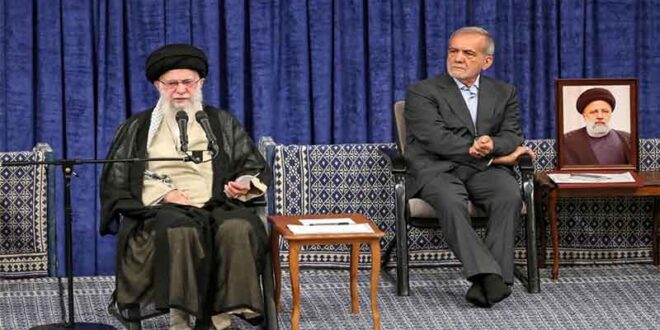Masoud Pezeshkian, who had vowed to form a “national consensus” (vefagh melli) government, could not deliver. Even though a few ministers are from the prior government, the key positions in his administration are given to those who had served in the reformist government of Hassan Rouhani until three years ago. That has angered the fundamentalists who thought they could share power in the new government. The pro-fundamentalist newspaper Kayhan wrote: “Pezeshkian has selected reverse of national consensus government as the jobs in the new government were being divided among those individuals who do not have the slightest belief in the values and principles of the system and have created chaos in the past.” Overall, the radical Islamists and the Revolutionary Guards were marginalized in the new administration.
In his speech before the Parliament, Pezeshkian frankly said the ministers’ nominees who were being introduced for confirmation had already been selected with coordination and approval from the Leader, Ali Khamenei. That was his tactic to prevent the rejection of nominees by the fundamentalists in the Parliament. About half of the parliament members are from fundamentalist groups, which include the Stability Front (Jebhe Paidari) and neoconservatives, whereas reformists and moderates constitute the other half. The parliament representatives had to yield to what had already been selected and approved by the leader behind the scenes.
Subsequently, the cabinet was almost unanimously approved with the help of Majles’ Head, Mohammad Bagher Ghalibaf, who is a close relative of Khamenei. Pezeshkian had previously helped Ghalibaf to be elected as the Majles’ head. So, Ghalibaf returned the favor by supporting the cabinet nominees who were put in for confirmation votes. Considering the leader had approved the nominees, the fundamentalists could not oppose the nominees’ confirmation. According to the Islamic Republic constitution, the Parliament must confirm the cabinet ministers before they can begin their job. The entire cabinet nominees of Pezeshkian received votes of confidence from the parliamentarians with an average of 237 votes out of 290 seats in the Parliament. Out of the 19 nominated ministers, most of them were able to win more than 200 votes of the representatives.
The fundamentalists had previously thought they could push Mohamad Javad Zarif out of the new administration, but they were wrong. Zarif is back to serve again as the Strategic Vice President and Head of the Presidential Strategic Studies Center. He is now the de facto president, as Pezeshkian lacks technocracy knowledge and experience. Pezeshkian, though not a cleric, seems to have the same ideology as them. He frequently quotes the Prophet Mohammad or the Shai Imams in Arabic. Pezeshkian said his first foreign trip would be to Iraq, where he would have a pilgrimage to Imam Ali’s shrine in Najaf.
Zarif’s colleagues from Rouhani’s administration now serve in the new administration. Abbas Araghchi is the minister of foreign affairs, and Majid Takht Ravanchi is his deputy. Araghchi wants to renegotiate the nuclear deal with the US at terms that please the United States. To please the West, Araghchi has indicated that Iran has no intention of providing its ballistic missiles to Russia.
 Eurasia Press & News
Eurasia Press & News




